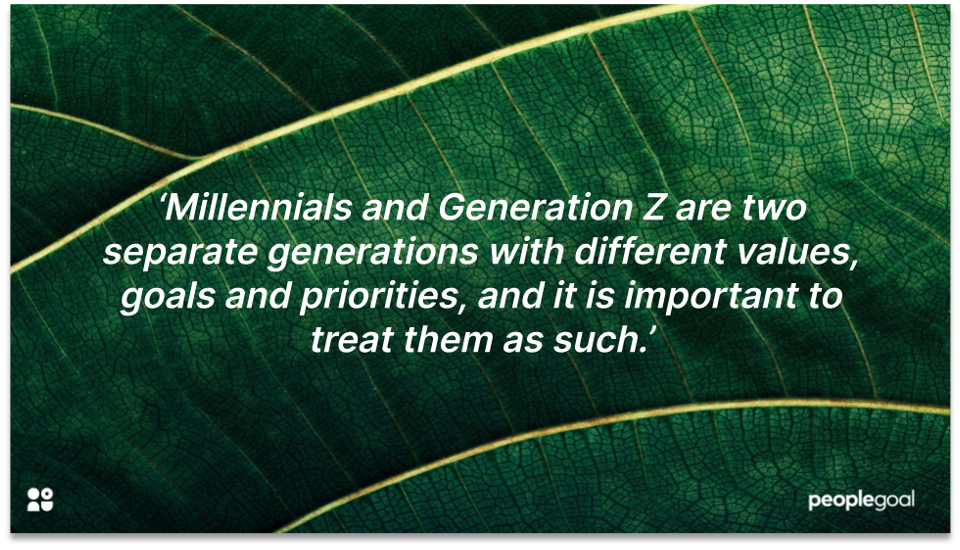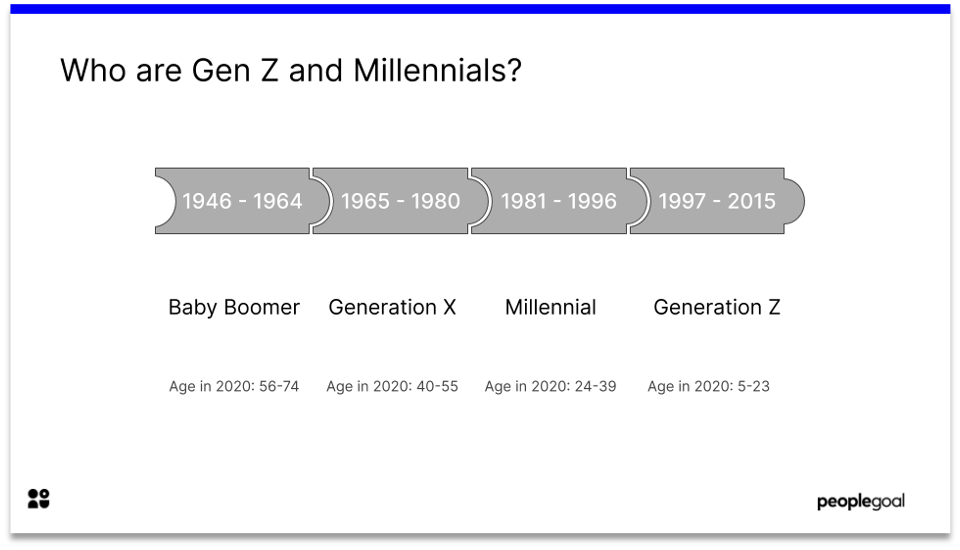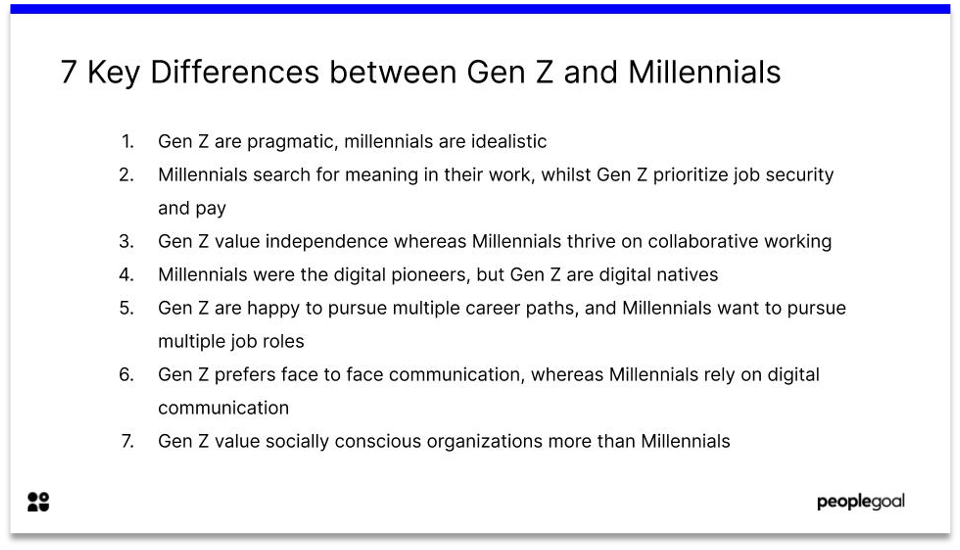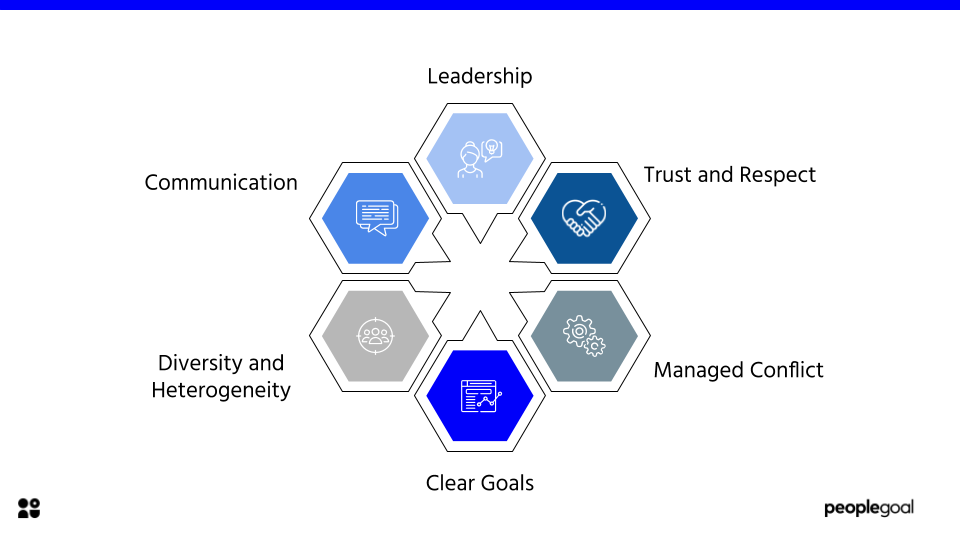Millennials vs Gen Z, not so similar after all…
Millennials vs Gen Z is the generational clash that many business leaders still struggle to understand. There is a common misconception that Generation Z and Millennials (also known as Generation Y) are the same, and they are often placed under the same umbrella. However it will come as a surprise to many that some Millennials are closer to 40 than 14. Millennials and Generation Z are two separate generations with different values, goals and priorities, and it is important to treat them as such.

Millennials and Generation Z will soon dominate the workforce, so HR leaders must understand their different work styles to create a positive working environment. In this article, we discuss the 7 key differences between Millennials and Generation Z in the workplace that effect structure, communication and development.
Who are Millennials vs Gen Z?
According to the Pew Research Center, millennials were born between 1981 and 1996 and anyone born between 1997 and the mid 2010s belongs to Generation Z. However, there is a grey area between those born in the mid 1990s, as some identify with behaviors associated with both Generation Z and Millennials.

Without further ado, lets get stuck in to the 7 key differences between Gen Z and Millenials.
1. Gen Z are pragmatic, Millennials are idealistic
Millennials were raised by optimistic Baby Boomers at a time of economic prosperity. Generation Z however, grew up during the Great Recession and are therefore more pragmatic about their situation. A staggering 77% of Gen Z believe they will need to work harder compared to previous generations to have a satisfying and fulfilling professional life. Covid-19 has made the future far more uncertain, and many Gen Zers are now in survival mode.
2. Millennials search for meaning in their work, whilst Gen Z prioritize job security and pay
Millennials want to find meaning in their professional life, and use their careers to make the world a better place. Whilst many think that this is Gen Z’s top priority, they are actually more focused on pay, job security and how they can advance their career. Whilst Gen Z care about making a difference, they are far more motivated by money and ambition than previous generations. Leaders looking to recruit members of Generation Z should consider promising job security and salary raises down the line.
3. Gen Z value independence, whereas Millennials thrive on collaborative working
Millennials have a collaborative mentality and are teamwork oriented, preferring to work together in open-plan office spaces. On the other hand, members of Gen Z often choose to work independently, with 45% preferring to work in a private office than a shared workplace. They are resourceful, having grown up with 24/7 access to information on their mobile devices, and want to be judged on their own merits. They are more likely to be competitive with their peers than older generations.
72% of Gen Z said they are competitive with those doing the same job.
So what does this mean in terms of managing mixed generation teams? It is important to set Gen Z workers individual goals as well as team goals to motivate them to perform at their best. It is also a good idea to have 1-on-1 check ins with younger staff to find out how they are getting on, and offer some them some individual coaching.
Just because Gen Z are prefer independent working does not mean they will not excel in team situations. Rather, it is important to judge their performance based on their individual contributions to the overall business success.
4. Millennials were the digital pioneers, but Gen Z are digital natives
Whilst Millennials lived through the coming of the digital age, Gen Z were born into it. Highly connected and digitally literate from a very young age, Gen Z are highly accustomed to rapidly changing environments. Employers will need to maintain focus on technological innovation to keep new workers inspired.
91% of Generation Z said technological sophistication would impact their interest in working at a company
This will have an impact on organizational structure as the younger generations will lead the way in terms of incorporating technology into the workplace. The youngest generation will at times be an authority on an essential part of business, which challenges the typical corporate hierarchy that their predecessors grew up in.
To accommodate this, it would be a good idea to encourage a feedback culture where all employees are encouraged to regularly give and receive feedback. This includes a ‘bottom-up’ feedback mechanism (e.g. an engagement survey) which will allow the younger generations to contribute to overall business strategy. Engagement surveys a great way to facillitate this, as these surveys will find the key drivers of engagement within your organization. Therefore, allowing you to assess whether your employees are engaged or disengaged.
5. Millennials want to pursue multiple job roles, but Gen Z want to pursue multiple career paths
Millennials became known as the ‘job-hopping’ generation, as they are the most likely generation to switch jobs. In contrast, 61% of Gen Z said they would stay at a company for more than 10 years if the organization aligned with their values.
Another key difference between Generation Z and Millennials, is that Gen Z are willing to perform multiple roles within an organization. Gen Zers follow their peers closely on social media and want to ensure they remain as skilled as possible. It would make sense to a Gen Zer to work on marketing projects for two days a week, and on product development for the remaining three.
Managers should capitalize on this generation of multitaskers and encourage Gen Z employees to try out different job responsibilities. This will help build a more skilled workforce, help combat career stagnation and reduce voluntary turnover rates.
6. Gen Z prefers face to face communication, whereas Millennials rely on digital communication
Despite being dubbed ‘digital natives’, Generation Zers actually show a preference for face to face communication. In a recent study 84% of Gen Z said face to face is their preferred mode of communication. In contrast, Millennials rely on digital communication tools and platforms.
One strategy for keeping Gen Z onboard is to facilitate regular face-to-face check-ins between managers and employees. Keeping them engaged throughout the year, not just when their annual review rolls around, will be key to employers’ success.
7. Gen Z value socially conscious organizations more than Millennials
Gen Z value honesty and integrity above all when it comes to their employers, with organization’s that are transparent, adaptable and personable scoring highest. There is a similarity here with Millennial employees, however Gen Z are more socially concious.
Gen Zers mobilize themselves for a variety of causes, from social to environmental issues. They don’t accept traditional gender roles, and they will eagerly fight against racial and sexual discrimination. They are also much more likely to seek out organizations that promote diversity and equality in the workplace.
To attract Gen Z, employers need to define and communicate who are they, their purpose and how they are different from their competitors. It is vital that the organization’s core values are communicated across social media channels, as well as showing support for social movements.

Conclusion
Organizations with a firm understanding of generational differences will be better equipped to attract and retain the next generation of talent (millennials or gen zers). With voluntary employee turnover on the rise, understanding and engaging the newer generations is more important than ever.
Leaders should learn to accept that it is not about which generation is better or worse, or right or wrong. Instead, they should embrace how each generation is different and bridge the generational gap in order to capitalize on a diverse workforce.
To find out more about creating a culture of feedback, improving employee engagment and running virtual 1-on-1 check ins, book a demo with PeopleGoal today.
Ready to 3x Your Teams' Performance?
Use the best performance management software to align goals, track progress, and boost employee engagement.






